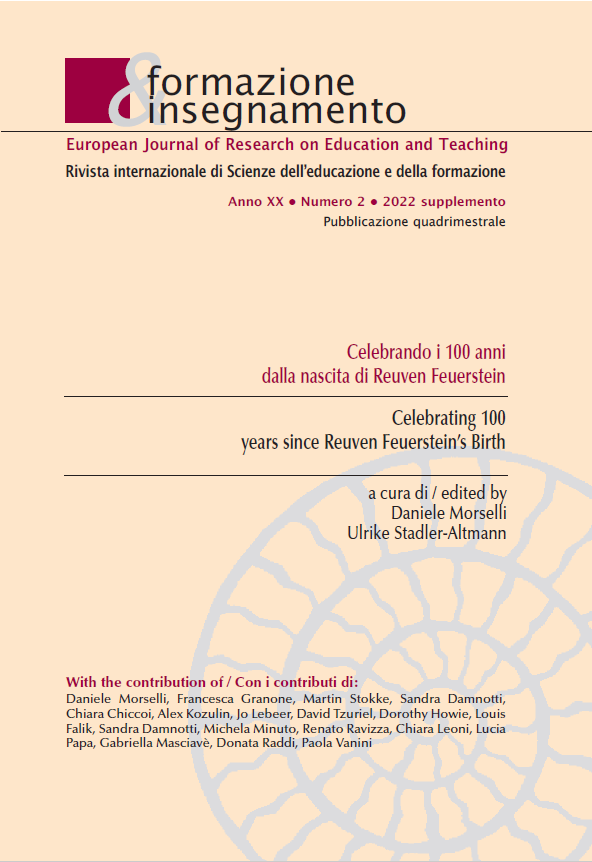The Mediated Learning Experience Contribution to the Therapeutic Process
DOI:
https://doi.org/10.7346/-feis-XX-02-22_06Keywords:
Mediated Learning Experience, Social cognition, Cognitive functions, micro-skills, therapeutic processAbstract
This paper proposes the application of mediated learning experience (MLE) as a foundation of the therapeutic process. It brings Feuerstein’s theory of structural cognitive modifiability (SCM) and its application MLE into an integrative model of social cognition that links MLE to the developmental and outcome objectives of a therapeutic interaction. The role of cognitive functions is described, and process concepts are linked to the model, including the nature responses (content and process), the quality of responding (implicit vs. explicit), and a parallel process of development. The application of MLE is linked the developmental phases of a therapeutic relationship.
References
Beck, A. & Freeman, A. (1990). Cognitive therapy of personality disorders. New York: Guilford Press.
Egan, G. (1986). The skilled helper. 3rd Edition. Monterey, California: Brooks Cole.
Doidge, N. (2007). The brain that changes itself. New York: Viking.
Doidge, N. (2015). The brain’s way of healing. New York: Viking.
Falik, L. H. (2021). Integrating social cognition into therapeutic practice: beneath and beyond the process of therapy. New York: Routledge.
Falik, L. H. & Feuerstein, R. (1990). Structural cognitive modifiability: A new cognitive perspective for counseling and psychotherapy, International Journal of Cognitive Education and Mediated Learning, 1(2), 143-150.
Feuerstein, R., Rand, Y., & Hoffman, M. (1979). The dynamic assessment of retarded performers: The Learning Potential Assessment Device (LPAD). Baltimore, MD: University Park Press.
Feuerstein, R., Falik, L. H., & Feuerstein, R. S. (2014). Changing minds and brains: Reuven Feuerstein’s Legacy. New York: Teachers College Press.
Feuerstein, R., Feuerstein, R. S., Falik, L. H., & Rand, Y. (2006). Creating and enhancing cognitive modifiability: The Feuerstein Instrumental Enrichment Program. Jerusalem, Israel: ICELP Press.
Feuerstein, R., Rand, Y., Hoffman, M.B., & Miller, R. (1980). Instrumental enrichment: An intervention program for cognitive modifiability. Baltimore, MD: University Park Press.
Feuerstein, R., Feuerstein, R.S., & Shur, Y. (1997). Process as content in regular education and in particular in education of the low function retarded performer. In A. L. Costa and R. M. Liebmann (eds.). If process were content: the spirit of learning. Thousand Oaks, CA: Corwin Press.
Flavell, J. (1963). The developmental psychology of Jean Piaget. New York: D. Van Nostrand.
Goleman, D. (1995). Emotional intelligence: Why it can matter more than IQ. New York: Bantam Books.
Goleman, D. (2006). Social intelligence: Beyond IQ, beyond emotional intelligence. New York: Bantam Books.
Goleman, D. & Davidson, R. (2017). Altered traits: Science reveals how meditation changes your mind, brain, and body. New York: Avery.
Hackney, H. L. & Cormier, S. (2016). Counseling strategies and interventions for professional helpers, 9th Edition. New York: Pearson.
Kottler, J. (1993). On becoming a therapist. New York: John Wiley.
Kottler, J. A. & Carlson, J. (2014). On becoming a master therapist. New York: John Wiley.
Ivey, A.E. (1971). Micro-counseling: Innovations in interview training. Springfield, Illinois: Charles Thomas.
Schwartz, J. M. & Begley, S. (2002). The mind and the brain: Neuroplasticity and the power of mental force. New York: Regan Books/Harper Collins.
Siegel, D. (2007). The mindful brain. New York: W.W. Norton.
Teyber, E. (1996). Interpersonal process in psychotherapy. Monterey, California: Brooks Cole.
White, M. (1995). Re-authoring lives. Adelaide, South Australia: Dulwich Centre Publications.
White, M. & Epston, D. (1990). Narrative means to therapeutic ends. New York: Norton.
Downloads
Published
How to Cite
Issue
Section
License
Copyright (c) 2022 Louis Falik

This work is licensed under a Creative Commons Attribution 4.0 International License.
Formazione & insegnamento is distributed under Attribution 4.0 International (CC BY 4.0).
For further details, please refer to our Repository & Archiving Policy, as well as our Copyright & Licensing Terms.





